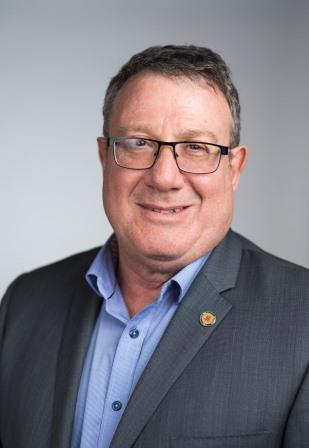GAVIN FINKELSTEIN
President, Haemophilia Foundation Australia
It is exciting to see more new therapies for bleeding disorders coming to the global market. Several of these are for haemophilia, and we look forward to novel therapies for other bleeding disorders as well. Gene therapy is also very close; in fact a gene therapy product for haemophilia B was recently approved by US regulatory authorities. Like many of my peers and our parents and relatives, I have been hearing about some of the possibilities over the years and it is great to see them becoming a reality.

You can find out more about the new haemophilia therapies in this issue of National Haemophilia or watch the webinar on our website. I would like to thank Dr Liane Khoo, Dr Sally Campbell and haemophilia nurse Stephen Matthews for putting together a topical session explaining how the new therapies work and what they mean for a person with haemophilia.
The progress of these new therapies towards being approved for use in Australia has followed clinical trials, some of which would have included Australian participants. Clinical trials are of course, a very important time in the development of a new drug or therapy, and we are always grateful for the work that goes into them, including for those who join the trials not entirely sure what the outcome might mean for themselves.
It is always important to remember that a treatment proposed in a clinical trial may not reach the market because it is not considered safe or effective by regulatory authorities or it may not be considered commercially viable. There are many hurdles to be overcome before we see some of the new treatments in the community. Nevertheless, HFA is very keen to encourage the pharmaceutical company sponsors of these new treatment products that have successfully tracked through the clinical trial phases to go ahead with seeking registration and assessment for funding so they can be made available to our community as soon as possible, if appropriate. We have commenced a program of education and advocacy with government as we want members of parliament to understand the importance of these new treatments to our community and funds to be made available for them to be accessible to those who need them for their treatment.
Our policy is that treatment choice must always be a decision between the person requiring treatment (or parents in the case of children) and their treating clinician. There can be many reasons why a specific treatment may or may not be suitable for individuals and we are now in an era where it is important to have a strong relationship with your Haemophilia Treatment Centre so that you can explore the opportunities.
With the new year about to start, some of you will be looking at starting your child at a new primary or secondary school. There is always a lot to think about, not least of all, how to manage your child and their bleeding disorder and what to tell the teachers. So much has changed in recent years and it will be important to educate the school. Our Haemophilia Treatment Centres do a great job of helping to support families and inform schools. I recommend you have a look at Janine Furmedge and Jaime Chase’s excellent article in this issue for some very helpful advice and tips.
I am very pleased to announce that we are now planning the next Australian Conference on Haemophilia, VWD and Rare Bleeding Disorders for 24-26 August 2023 in Melbourne. This will be an in-person event and a great opportunity for us to come together as a community to hear the very latest information and discuss where we are going with treatments, comprehensive care and living well generally. Save the date in your calendar!
Haemophilia Foundation Australia acknowledges the Traditional Owners and Custodians of Country throughout Australia, the land, waters and community where we walk, live, meet and work. We pay our respects to Elders past and present and extend that respect to all Aboriginal and Torres Strait Islander peoples.
Sign up for the latest news, events and our free National Haemophilia magazine